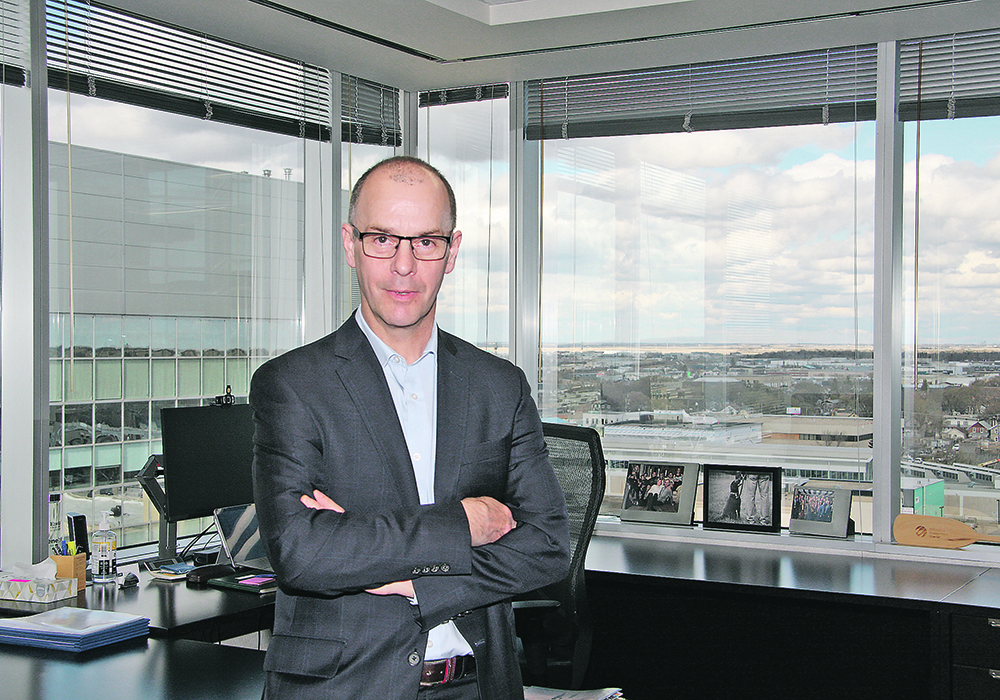Michael Hoffort could look out from his corner office in the downtown Regina Farm Credit Canada tower and see farmland.
The recently retired chief executive officer of the federal crown corporation said that view was the perfect reminder of FCC’s customers and the focus it, and he, should have.
“It grounded us in a positive way,” he said as he prepared to leave June 30 after a 34-year career.
Hoffort gained the top job in 2014 after starting with FCC in 1988.
He grew up in Turtleford, Sask., and in Regina. His father was what was then known as an ag rep for the provincial government and the family kept an active interest in the farm.
Read Also

American researchers design a tomato plant that talks
Two students at Cornell University have devised a faster way to detect if garden plants and agricultural crops have a sufficient supply of nitrogen.
“At the time people didn’t do real vacations; they went to the farm,” he recalled.
Hoffort followed his father’s footsteps by attending the University of Saskatchewan and obtaining a degree in agricultural economics.
After a couple of summer jobs in production agriculture, he decided agribusiness was his focus.
“The farms I was involved with on both sides of the family, my father’s and my mother’s, they were well established, not a lot of leverage, so I think I was a bit oblivious to how serious the farm debt crisis was that was happening, until I started with FCC,” he said.
In the late 1980s the farm debt crisis was rolling across the country along with double-digit interest rates.
Hoffort was thrown into working with farm families to resolve unmanageable debt levels through restructuring, quit-claiming land and renting it back, and other arrangements. There were a lot of kitchen table discussions, he said.
“For a 22 or 25-year-old individual, I sometimes thought Farm Credit should have sent somebody else that was probably a little bit bigger than me, but I think it also taught me respect and honesty and thoughtfulness and how you work through difficult problems with people. That part was formational in my early career.”
Hoffort spent nine years in Prince Albert and Tisdale before moving to North Battleford, where the environment had changed and he was able to start lending money.
He was finally seeing the other side of the farming business in which people were optimistic, trying to expand or bring in another generation, and invest in new technology. He still remembers financing his first no-till ConservaPak air drill.
FCC moved its head office from Ottawa to Regina in the early 1990s and he moved in 1997.
His next role would be working again with some of the farmers who had run into trouble in the late 1980s.
FCC was administering about 1.4 million acres, most of it in Saskatchewan, and leased it back to the former owners. As a land manager, he was working to help them buy their land back and in the end 60 to 70 percent did.
“The leases were running out and we had to create a strategy on how we’d work to sell this land back into private ownership, and optimize how much went back to the people who had owned it originally, was a key goal that we had,” he said.
“I had a good chance to contribute to that strategy document and some of the research we did to make sure it was going to work and we weren’t going to harm anybody.”
As rewarding as that was, Hoffort said he hopes no one at FCC has to do that again.
He eventually moved from the risk side of FCC to operations and then into leadership. He was the head of FCC’s risk before he applied for the top job.
He held that risk position just after the financial crisis hit in 2008, when banks and regulations were adjusting.
FCC also had to change with the times and Hoffort was involved in implementing a modernization plan based on a review of all the crowns. That, and his past lending experience, likely moved him up in the CEO competition.
Hoffort said he is proud of how FCC has grown and evolved during his time with the corporation.
He has watched it go from being essentially bankrupt in 1988 and relying on a government injection of $1.2 billion, to become a $44.5-billion organization, and from being a lender of last resort to a sustainable customer-focused organization.
Loans range from $50,000 to $150 million, he said, and he likes the focus on small and medium-sized enterprises and young entrepreneurs.
“We pay our own way. We’re profitable. We’ve got a really robust offer and we also do some really interesting mandate things that I think have been good for the industry and really allow us to flex into what you’d want from a crown like ours,” he said.
For example, FCC was the catalyst for Ag More Than Ever and it has a successful campaign called Drive Away Hunger that helps feed vulnerable community members.
“My hope is that (people) look and say, ‘wasn’t that a great run for the industry and the organization’,” he said, when asked what others will say about his time as leader.
Hoffort’s transition to retirement is eased by the promise of spending more time with his and wife Loralie’s three children and six grandchildren, along with some hobbies.
While many families adopted dogs or cats during the pandemic, the Hofforts got horses.
“My wife went away for two weeks to support one of our daughters when she had a new baby boy and I got kind of lonely and bored and started thinking we gotta figure out something we can do together,” he explained.
Loralie had horses until they got busy with kids and work and he decided he could learn to ride too. Lessons at Beaver Creek followed, and the couple was soon driving all over the province looking for horses.
His plan for them to do something together didn’t quite work, he admitted.
“My wife got involved in hunter jumper stuff and I’m more doing this cow horse thing, which is a little bit different,” he said, but they do the odd trail ride together.
Hoffort has also competed extensively in endurance athletics, participating in Ironman triathlons for more than 20 years. That was disrupted by the pandemic and he hopes to get back into it.
He said by 2023 he will probably be ready to get back to work in some capacity in agriculture.
He enjoyed time on the STARS and Special Olympics boards so there may be opportunities in that field.
And, he said he is willing to help some friends farm.
“I’m not the best labour but they can kind of trust me to pull the grain cart,” he said.
Hoffort said he will miss the customers and the staff most of all. FCC is known for its workplace culture and he describes it as a high-performance organization.
“There’s a secret sauce there that I’m sure I’ll miss,” he said.
















